Menu

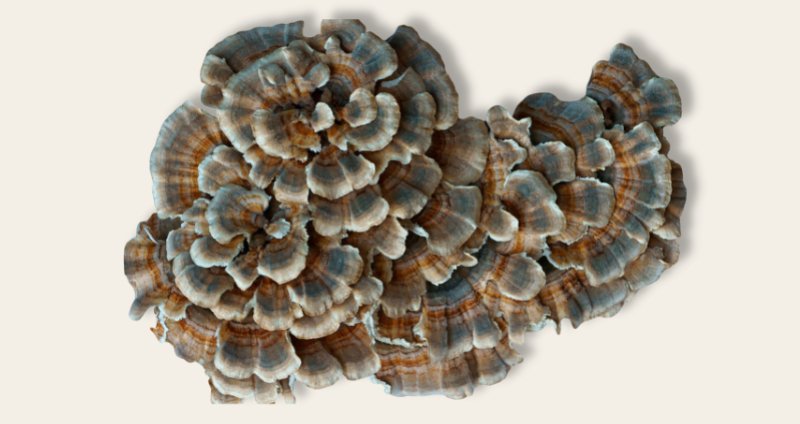
The turkey tail mushroom is a fascinating fungus that can be found in just about any forest in the world. Traditional Chinese medicine practitioners have used it for centuries; now, the modern medicinal world has gotten in on the action.
Here are 17 interesting facts about turkey tail mushrooms, covering where they’re found, how they can be taken to support your health, and what makes them so unique.
Turkey tail mushrooms (Trametes versicolor) are polypore fungi. They grow on decaying trees and dead logs, especially oak and maple trees.
They are most common in deciduous woodlands. They grow in temperate woods all over the world, including North America, Europe, and Asia.
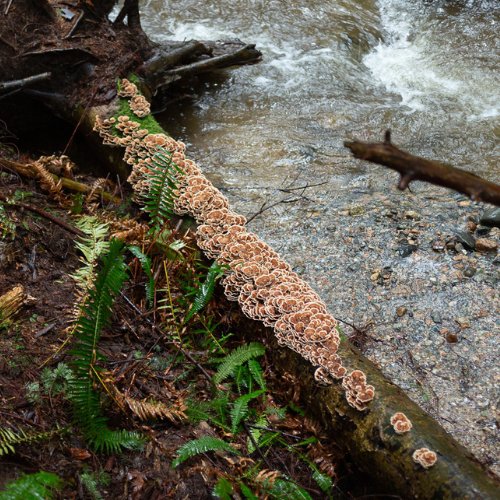
Turkey tail is a polypore, a kind of fungus with pores on the underside of the cap, as opposed to gills. The spores that the mushroom generates are in these pores.
Many species, which often grow on wood, are known to be non-toxic and to have health benefits.
Saprophytic mushrooms are ones that get their nourishment from decomposing, dead organic matter like fallen trees, logs, and other plant matter. That’s why you’ll typically find turkey tail mushrooms growing on dead or decaying objects like logs or tree stumps.
Turkey tail digests organic material, releasing the nutrients that the forest needs for future growth. Therefore, saprophytic mushrooms are crucial for forest ecology.
There are seven general traits that characterize turkey tail mushrooms:
The last trait is the most important one for identifying a true turkey tail mushroom from false turkey tail mushrooms and other lookalikes.
Proper Mushroom Identification: Want to be a better mushroom forager? We have a full guide for how to identify turkey tail mushrooms and how you can tell real turkey tail from false turkey tail and other polypores!
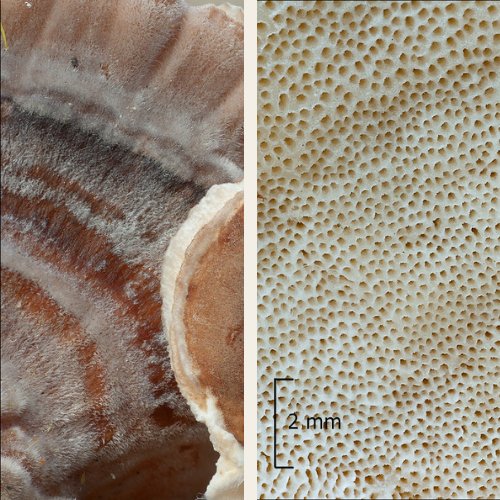
Sure, they are, as long as you don’t mind your mushrooms being leathery and hardly chewable.
While turkey tail mushrooms are not toxic and have many compelling health-supporting properties, they are not exactly a culinary delight. This is why people who want to receive turkey tail’s health benefits opt for turkey tail supplements derived from mushroom (fruiting body) extracts.
If you want to tap into the fantastic fungal compounds that make this mushroom so famous, you’ll have to extract them with lots of heat.
You can do as the traditional medicine practitioners did, forage for turkey tail in your local forest, and then boil the heck out of the mushrooms to make tea. However, if you want an easy and precise way to use turkey tail for its functional health benefits, you’re better off buying supplements made from turkey tail mushroom extracts.
Nope. Unlike amanita mushrooms or psilocybin mushrooms, turkey tail mushrooms have no psychotropic compounds.
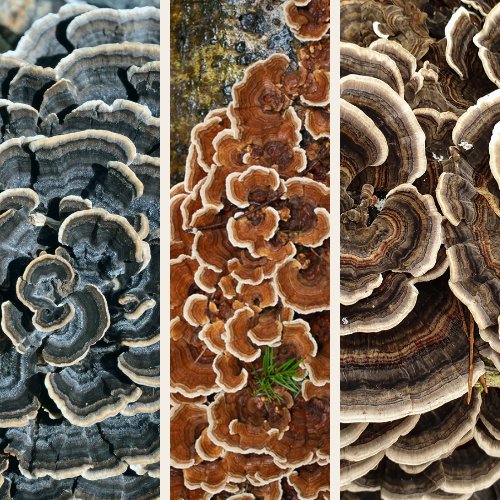
Turkey tail mushrooms contain properties that support the body’s immune response and other functional benefits. Some of the healthy compounds found in turkey tail include:
Phenols: The phenolic chemicals flavonoids and phenolic acids, which have antioxidant characteristics, are also present in turkey tail mushrooms and help the body maintain cellular health and a balanced inflammatory response.
The turkey tail mushroom has become famous primarily for its positive impact on the immune system.
Many of its naturally-occurring compounds are biomodulators. Biomodulators can regulate and modify the immune system and other biological functions in the body.
By fostering healthy cellular activity and balancing the immune system and inflammation responses, the compounds in turkey tail mushrooms can support the body's inherent capacity to heal and repair [1] [2] [3] [4].
Potential Health Benefits: For a more complete list of the ways turkey tail mushrooms can support health and longevity, read this article.
There are a number of non-health-related uses for turkey tail mushrooms. Here are four examples:
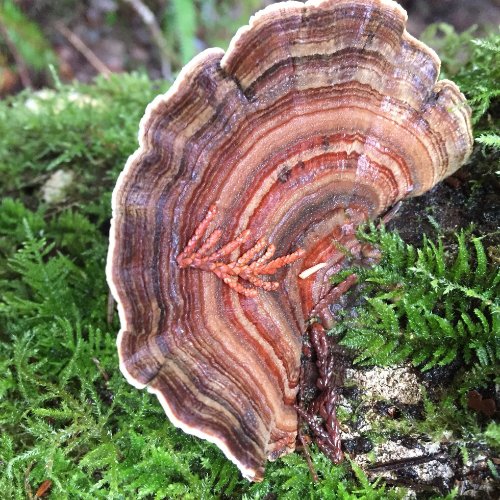
Data is relatively limited and contradictory, but there is some evidence that turkey tail mushrooms may have an impact on estrogen levels. Turkey tail mushrooms may have estrogen-like physiological actions, which may be advantageous for addressing menopausal symptoms.
In one clinical study, the production of estrogen in postmenopausal women was enhanced by an extract of turkey tail mushrooms. Therefore, it may be possible that turkey tail supplementation could reduce symptoms like hot flashes and vaginal dryness.
Some research, however, contends that turkey tail mushrooms may potentially have an anti-estrogenic impact that is advantageous for diseases that result from cell abnormalities.
Ultimately, more research is required to completely understand how turkey tail mushrooms affect the body's ability to balance hormones.
Yes, there are several compounds in turkey tail mushrooms that can have a positive effect on gut health [5] [6] [7].
The polysaccharides in turkey tail mushrooms have been demonstrated in studies to have prebiotic effects on the gut. Prebiotics are substances that support the development and activity of good bacteria in the stomach, which can enhance gut health and digestion.
Moreover, the beta-glucans and triterpenoids in turkey tail mushrooms have antioxidant properties and can help balance inflammatory responses in the body. Antioxidants can assist in protecting the gut lining from damage brought on by free radicals.
Persistent inflammation in the gut can contribute to a range of digestive problems, including irritable bowel syndrome (IBS) and inflammatory bowel disease (IBD).
According to one study, taking a turkey tail mushroom extract supplement enhanced the gut microbiota composition and raised the number of helpful bacteria.
In a different study, people with ulcerative colitis, an inflammatory bowel illness, discovered that turkey tail mushroom extract supplementation helped reduce symptoms and improve quality of life.
Additional research is necessary to completely understand the effects of turkey tail mushrooms on gut health. However, the information that is now available suggests that these mushrooms may be useful as a dietary supplement for enhancing digestion and balancing gut inflammation.

There is some indication that turkey tail mushrooms may help people lose weight, but further studies are required to substantiate these findings.
Turkey tail mushrooms may aid in weight loss and body fat reduction by enhancing insulin sensitivity, modulating gut microbiota, and increasing metabolism, according to certain research [8] [9].
More research on humans will be required to make a definitive claim, as the studies that have been done thus far have primarily been done on animals and in vitro.
There is some evidence to support the idea that turkey tail mushroom supplementation may offer dogs and cats similar health advantages as those experienced by humans.
Here are four ways turkey tail mushrooms can enhance pet health:
Polysaccharides and other substances found in turkey tail mushrooms have been demonstrated to help the immune system by promoting the generation of white blood cells. This can be especially helpful for animals with compromised immune systems due to disease or advanced age.
Turkey tail mushrooms can help dogs and cats have better gut health by encouraging the growth of good bacteria in the stomach and lowering inflammation in the digestive system.
Turkey tail mushrooms have been used by some vets and pet owners as part of a holistic strategy for treating cancer in animals, though additional research is required.
Turkey tail mushrooms contain substances that can balance the body’s inflammatory response, which may be helpful for animals suffering from inflammatory diseases like arthritis.
Preparing Mushrooms for Pets: You can learn more about how turkey tail mushroom supplementation can support pet health in this article.
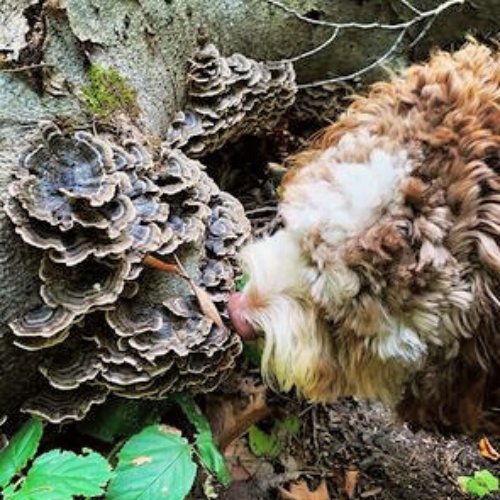
Supplements containing turkey tail mushrooms may cause adverse effects, just like any dietary supplement or prescription drug.
Although these supplements are usually harmless for most individuals, some people may experience the following side effects:
It's crucial to remember that these negative effects are uncommon. However, it's wise to consult your healthcare provider before taking any supplements that contain turkey tail mushrooms.
There is no proof that supplementing with turkey tail mushrooms harms the liver. In fact, certain research studies indicate that turkey tail mushrooms may have advantages for liver health.
However, some supplements, especially those containing turkey tail mushroom extracts, could be tainted with dangerous elements that might affect the liver. For instance, there have been instances of lower-quality supplements containing heavy metals or other harmful contaminants.
Therefore, it's important to select a turkey tail supplement from a high-quality, reputable brand that uses organic farming methods and rigorous product testing protocols to reduce the risk of liver toxicity. Also, any supplement should be used in accordance with the stated dosage guidelines.
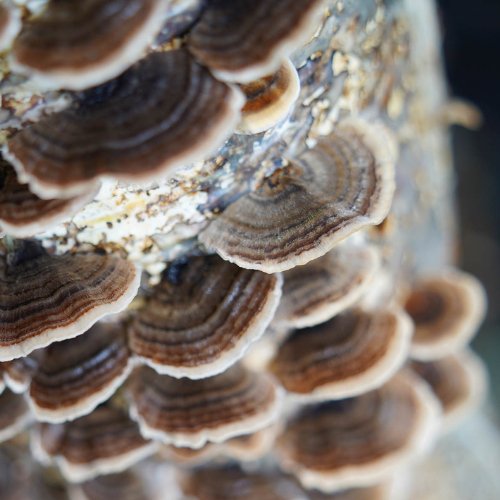
In general, it is easy to find turkey tail mushroom supplements online, in a health food store, or from a supplement merchant.
However, like other products in the supplement industry, quality varies widely from brand to brand. Some mushroom supplement companies have been known to produce misleading labels or adulterate the ingredients in their products.
There are six qualities you should look for when buying a turkey tail supplement product that will be safe and provide high levels of the beneficial compounds that will support your health:
To understand more about each of these qualities and why they matter, read our article “Finding the Best Turkey Tail Mushroom Supplement: A Buying Guide.”
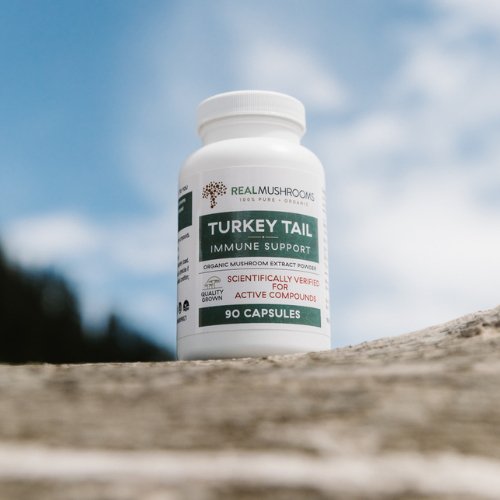
Turkey tail mushrooms offer many beneficial effects, as recorded by various scientific studies. Traditional Chinese medicine has long utilized these mushrooms, and modern research has identified their significant health benefits.
Though generally safe, they may cause mild side effects in some individuals. When purchasing supplements, it's essential to choose high-quality, organic products tested for purity.
At Real Mushrooms, we provide turkey tail extract products sourced from 100% organic mushrooms (fruiting bodies) for optimal health benefits. Our turkey tail supplements come in bulk powder, tincture, and capsule form, so you can easily integrate them into your diet.

1. Urushima, H., Kubota, Y., & Sumi, Y. (2008). Effect of Yunzhi (Coriolus versicolor) polysaccharide on the modulation of immune functions by murine splenocytes. Journal of medicinal food, 11(4), 643-648.
2. Wong, C. K., Bao, Y. X., Wong, E. L., Leung, P. C., & Fung, K. P. (2011). Immunomodulatory activities of Yunzhi and Danshen in post-treatment breast cancer patients. American Journal of Chinese Medicine, 39(03), 259-267.
3. Zaidman, B. Z., Yassin, M., Mahajna, J., & Wasser, S. P. (2005). Medicinal mushroom modulators of molecular targets as cancer therapeutics. Applied microbiology and biotechnology, 67(4), 453-468.
4. Choi, Y. H., Kim, G., Han, S. H., & Jeong, J. W. (2017). Immunomodulatory effects of Trametes versicolor mushroom and its fermented mycelia on LPS-stimulated RAW 264.7 macrophages and the safety evaluation in BALB/c mice. Journal of ethnopharmacology, 208, 49-56.
5. Lee, S. Y., Lee, D. H., Chung, W. C., Han, S. Y., Jeong, Y. M., Moon, K. M., ... & Kim, K. M. (2017). Trametes versicolor extract modulates the gut microbiota composition in C57BL/6J mice. Biomedical Reports, 6(6), 633-638.
6. Ming, L. J., Yin, S., Zhang, J., & Zhou, J. F. (2019). Effects of Trametes versicolor polysaccharides on gut microbiota in mice with dextran sulfate sodium-induced colitis. Journal of food biochemistry, 43(8), e12991.
7. Dai, Z., Coker, O. O., Nakatsu, G., Wu, W. K. K., Zhao, L., Chen, Z., & Chan, F. K. L. (2020). Effect of a polysaccharide from Trametes versicolor on the gut microbiome of mice with colitis and its therapeutic effect on dysbiosis. Food & function, 11(6), 5069-5078.
8. Li, X., Chen, P., Zhang, P., Chang, Y., Cui, M., & Duan, J. (2019). Protein‐Bound β‐glucan from Coriolus Versicolor has Potential for Use Against Obesity. Molecular nutrition & food research, 63(7), 1801231.
9. Lo, H. C., Hsu, T. H., & Lee, C. H. (2020). Extracellular polysaccharopeptides from fermented Turkey Tail medicinal mushroom, Trametes versicolor (Agaricomycetes), mitigate oxidative stress, hyperglycemia, and hyperlipidemia in rats with type 2 diabetes mellitus. International Journal of Medicinal Mushrooms, 22(5).
Disclaimer: The information or products mentioned in this article are provided as information resources only, and are not to be used or relied on to diagnose, treat, cure, or prevent any disease. This information does not create any patient-doctor relationship, and should not be used as a substitute for professional diagnosis and treatment. The information is intended for health care professionals only. The statements made in this article have not been evaluated by the Food and Drug Administration. Any products mentioned are not intended to diagnose, treat, cure, or prevent any disease. The information in this article is intended for educational purposes. The information is not intended to replace medical advice offered by licensed medical physicians. Please consult your doctor or health practitioner for any medical advice.